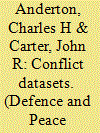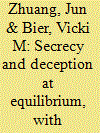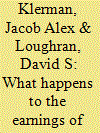|
|
|
Sort Order |
|
|
|
Items / Page
|
|
|
|
|
|
|
| Srl | Item |
| 1 |
ID:
104335


|
|
|
|
|
| Publication |
2011.
|
| Summary/Abstract |
Prominent conflict datasets used in the social scientific study of war and peace are summarized. These include datasets for armed conflicts (e.g., COW and UCDP/PRIO wars and sub-war conflicts), terrorism (e.g., GTD and ITERATE terrorist incidents), and events (e.g., WEIS, KEDS, and VRA cooperative and conflict actions). Topics explored include the diversity of conflict types, alternative definitions of war and sub-war conflict, historical patterns of violence in the international system, and degree of overlap across datasets.
|
|
|
|
|
|
|
|
|
|
|
|
|
|
|
|
| 2 |
ID:
104338


|
|
|
|
|
| Publication |
2011.
|
| Summary/Abstract |
We use a CGE model to simulate the effects of a one-year US border closure. Relative to previously used input-output modeling, CGE modeling offers a flexible framework for capturing bottleneck and labor-market effects. Our analysis suggests that the costs of a prolonged closure could be much greater than indicated by input-output studies. We find that cutting all imports by 95% in an environment of sticky real wages would reduce GDP by 48%. However, if bottleneck imports (mainly oil) were exempt and workers accepted real wage cuts then the GDP reduction would be only 11%.
|
|
|
|
|
|
|
|
|
|
|
|
|
|
|
|
| 3 |
ID:
104337


|
|
|
|
|
| Publication |
2011.
|
| Summary/Abstract |
This paper reviews four economic theories of leadership selection in conflict settings. The 'credibility rationale', argues that hawks may actually be necessary to initiate peace agreements. The 'bargaining rationale' predicts that while doves are more likely to secure peace, post-conflict hawks may be rationally selected. The 'social psychological rationale' captures the idea of a competition over which group can form the strongest identity. Dove selection can be predicted during conflict, but hawk selection post-conflict. Finally, the 'expressive rationale' predicts that regardless of the underlying nature of the game the large group nature of decision-making in rendering individual decision makers non-decisive in determining the outcome of elections may cause them to make choices based primarily on emotions. Finally, the paper analyses the extent to which the theories can throw light on Northern Ireland electoral history over the last 25 years.
|
|
|
|
|
|
|
|
|
|
|
|
|
|
|
|
| 4 |
ID:
104336


|
|
|
|
|
| Publication |
2011.
|
| Summary/Abstract |
In this work, we develop a game-theoretic model for whether and how a first mover should disclose her resource allocation. Our model allows us to explore whether the first mover should disclose correct information about her resource allocation, incorrect information, or no information. Although we study secrecy and deception specifically in the homeland-security context where the first mover is assumed to be the defender, our work can also provide insights in other contexts, such as business competition.
|
|
|
|
|
|
|
|
|
|
|
|
|
|
|
|
| 5 |
ID:
104334


|
|
|
|
|
| Publication |
2011.
|
| Summary/Abstract |
From 2001 through 2008, the US Department of Defense (DoD) has activated more than 700,000 military reservists. Activation imposes a variety of costs on reservists. Among those costs is potentially a decline in total earnings during the period of activation. In this paper, we use administrative data on military and civilian earnings to estimate how earnings change when reservists are activated and the causal effect of activation. Contrary to press accounts and DoD survey evidence, our estimates indicate that, on average, the earnings of activated reservists increase substantially when they are activated and that earnings losses are not common.
|
|
|
|
|
|
|
|
|
|
|
|
|
|
|
|
|
|
|
|
|